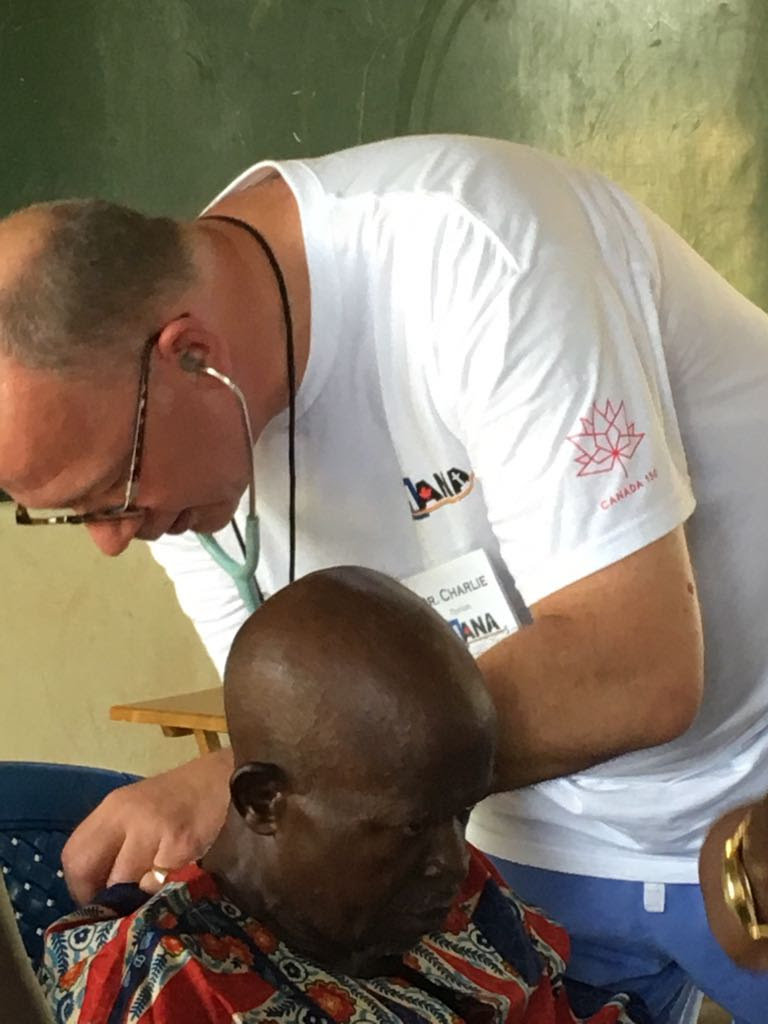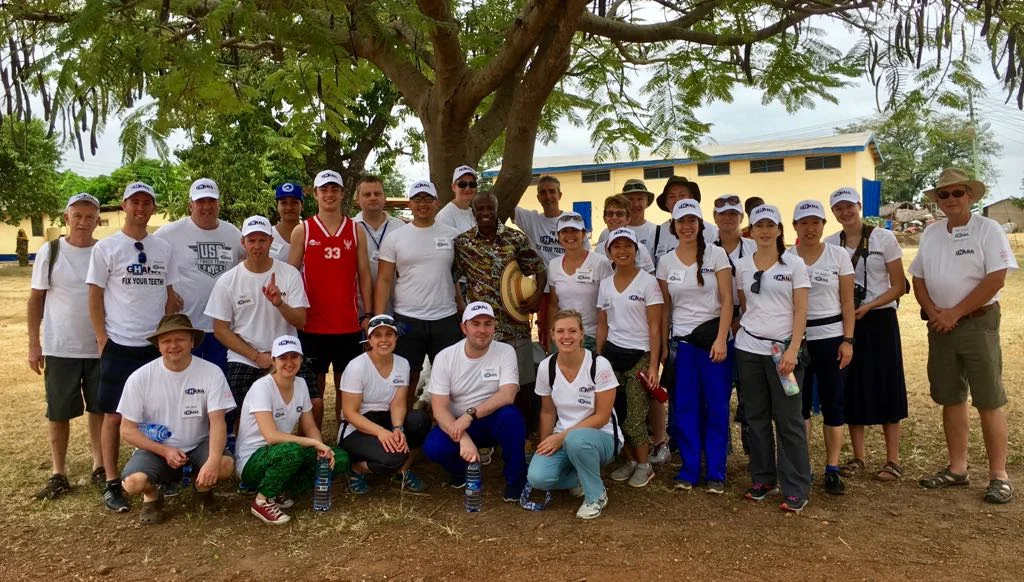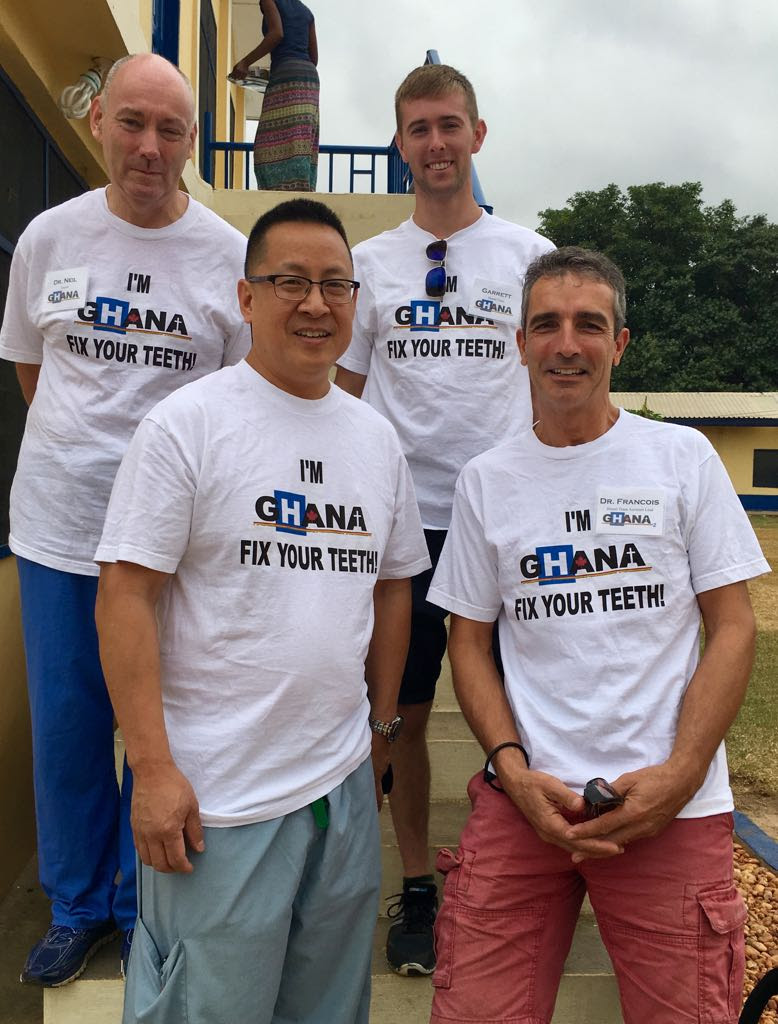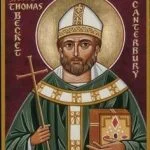By Dr. Jennifer Wilson
Everyone in the clinic eagerly anticipates 3:00 pm every day when Caitlin, our international development student (who is responsible for our medical records and statistics) visits every team member. She carries a “Keep Calm and Carry On” tin which contains a little sheet of paper with inspirational quotes and a small treat. Today I will open and close with two of yesterday’s quotes that arrived to us with a piece of ‘Double Bubble” chewing gum.
The world is full of good people. If you can’t find one, be one. – Mother Teresa
Dr. David is a new Ghanaian physician who was sponsored through school by NEA. He divides his time learning new surgical skills with our hernia team and working with the medical doctors in the village. When I work with David, I am reminded of how special our Ghanaian physicians are. They are very well trained, very thorough, and they remain so compassionate and patient regardless of the many challenges that come while (or should I say whilst) trying to provide care in a low-resource setting. We had a surgical emergency in the village today where I was reminded yet again of the calibre of Ghana’s health professionals. Dr. Elke was our surgeon in the village who dealt with this emergency. We consulted with Dr. David, whose first question to the patient was “Do you have health insurance?” When the answer was no, we asked each other whether our surgical team at Carpenter could handle this case. Dr. David’s response, “Please, it is his only hope. If we don’t try and save him he will simply die. By the time we got home from the clinic, this young man had been operated on by Dan and Magdi (with David Mensah observing, I hear) and the surgery was a success. The world is full of good people.
Nurse Rita just completed her nursing training in Ghana and is another one of NEA’s scholarship students. Rita has been a joy to work with and is bubbling with enthusiasm. As part of this team she has a chance to work with 13 nurses with a wealth of experience and she is soaking up every minute. We had a little boy in the clinic with a very unstable knee due to a football injury. His MCL and ACL was ruptured, so walking was difficult. I sent him over to our nursing station to see if they could rig up some kind of support for his knee. That sweet boy returned with the biggest smile on his face with nurse Rita, Nicole and Judy, wearing a perfectly fitted knee brace that gave him enough stability that he now walk freely. Team funds will be needed to assist him with the surgery he will need. The world is full of good people.
The young patient with his mother and nursing team of Nicole, Judy and Rita.
Our dentist Kyle is here for the 7th time. He had a very special patient from the Fulani tribe in 2009 and she returns for her annual check up every year. Kyle has been taking a picture of her and her large family every year. This year, he gave her printed copies of these family pictures. Can you imagine? Later than afternoon this woman presented Kyle with a chicken. You must understand the Fulani tribe of migrant cattle workers are the poorest people in Ghana. Yet she has given her dentist this expensive gift. The world is full of good people.
Dr. Kyle with the gift of a chicken.
After dinner, team reports were enjoyed by all. Our surgical team say there are not enough adjectives to add to awesome to describe their last couple of days. Thus far, 150 hernias have been repaired and Rob believes they will meet the target of 300 by the end of the fortnight. (By the way, fortnight is my new favourite word). Perry and Eric (now referred to as Team Stellar) diagnosed a child with congenital heart disease, and this morning he will be seen by Dr. Anne our paediatrician and Dr. Charlie our heart surgeon. Oh, and newlywed nurse Mel received her first marriage proposal — I think that is 4 in total for our surgical nurses.
Nurse Sue gave a wonderful report on behalf of our surgical nursing team, Garrett on behalf of our dental team, Elise on behalf of the pharmacy team (who enjoyed 30 minutes of power today), and Jane on behalf of the eye team. We are not driven by numbers around here, but just to give you a sense of the scope of the work of our medical, dental, and eye teams, over 2,000 patients have already been cared for. Wow.
After dinner we gathered in the Mensah living room where David gave us his own quote worth noting: “We have come into agreement with tender hearts that everyone deserves things like clean water, food, education and health care. He introduced Mumuni, who is manager of the Leyaata Ane Project designed to rescue moms and babies from dying in childbirth. Between 2016 and 2017, 3814 pregnant women have been visited and assisted to deliver in a health facility and all of those babies are visited 3 times in the first week of life to look for danger signs such as fever, poor weight gain and jaundice that would require an emergency referral. Support and capacity building in neonatal resuscitation was provided by Dr. Carlye and me in 2015, but our Ghanaian master trainers have scaled up the ongoing training and support: neonatal resuscitation and early newborn care has been extended to 79 health workers and 105 traditional birth attendants. As a result, 1145 babies who would have died at birth were successfully resuscitated between 2016 and today. Our team was speechless. As a result of this program, which receives funding support from Global Affairs Canada, the neonatal death rate has dropped from 40-50/1000 to 5/1000.
Dr. Mensah concluded our evening but sharing a little bit about the vision for the “Leyaata Hospital“: a 50-bed model hospital, staffed and run by Ghanaian health workers under the leadership of NEA. A hospital that is desperately needed right now. Back at home we are working very hard to complete the capital campaign and we are well over the half-way mark. This campaign will provide the funds to build and run the hospital for 3 years after which it will be sustainable — just like every other NEA program. Dr. Rob, who was part of our one-year hospital feasibility study, is hoping to put some of the engineering drawings up in our dining room for the team to enjoy. Please see the GRID/NEA website if you want more information about this hospital — our collective dream come true!
The last quote on our little piece of paper yesterday was
Speak up for those who cannot speak for themselves, for the rights of all who are destitute. Speak up and judge fairly; defend the rights of the poor and needy. (Proverbs 31:8-9)
This week our team with tender hearts have spoken up and we have defended the rights of the poor. Every day the Leyaata team with tender hearts is speaking up for the babies that cannot speak for themselves. And the day is coming soon when the Leyaata Hospital, full of tender-hearted Ghanaian health professionals like Dr. David, nurse Rita and pharmacist Emmanuel, under the leadership of NEA, will be defending the rights of the poor and needy for generations to come. I pray really hard that as we add more good people and more tender hearts to the NEA fan club, these hospital doors could be open sooner than we think.






















